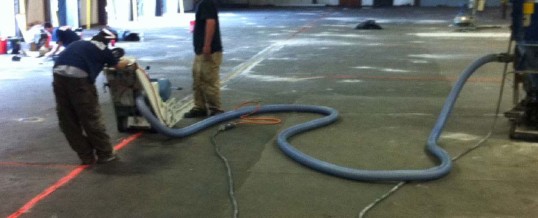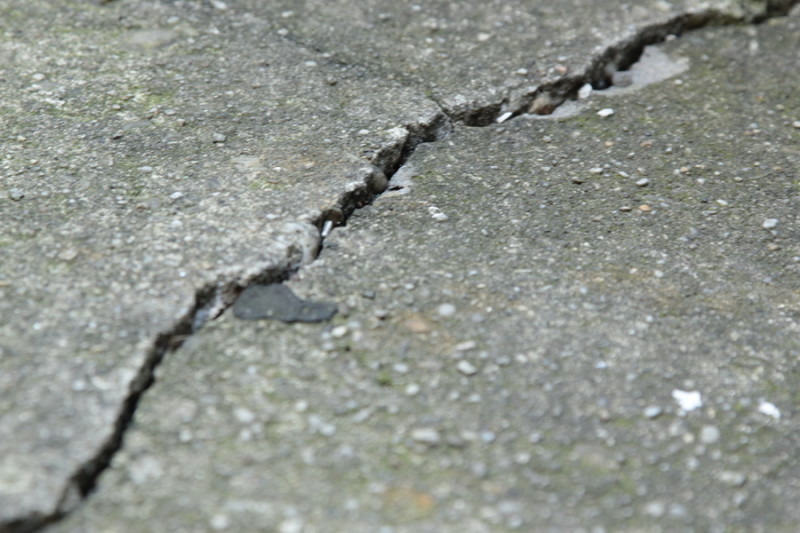
Concrete is a common material for flooring because it is strong, but that does not mean it cannot be damaged. A large warehouse or industrial setting puts heavy equipment and a significant amount of foot traffic in contact with floors daily. Most concrete floors have a few small cracks or chips.
Repair is straightforward, but if it is not completed in a timely fashion, the damage can worsen. Cracked concrete contributes to a dirty floor and may also attract excess moisture and unwanted pests. When damage is excessive, it can be a tripping hazard for employees and even affect the structural integrity of the building.
Fortunately, the solution is usually a quick and inexpensive repair. Here are four tips to keep in mind when concrete crack repair is on your agenda.
1. Do Not Put Off the Repair.
The most important element in planning a concrete crack repair is to schedule it sooner, rather than later. It is easy to see a small crack and assume that it is unattractive, but not a serious problem. Although it is probably not yet serious, a small crack will continue to grow and spread.
Procrastination can make the difference between a simple repair and a complex one. It may be beneficial to have your floors evaluated prior to repair. A quality contractor will assess the damage and create a comprehensive plan that includes repair, protection, and maintenance.
2. Hire a Professional.

Minor concrete cracks at your home, particularly in the driveway, are an easy fix for those who prefer the do-it-yourself method. In a business setting or when the damage is more than a minor blemish, the job is often better handled by a professional.
When you hire a concrete contractor, you will receive professional service that is guaranteed to be done correctly the first time. Professionals often have access to higher grade materials and equipment that the individual consumer does not.
These can save time and reduce overall costs. Ask your contractor about the type of warranty included with service.
3. Determine the Cause of the Crack.
It is important to determine what caused the crack to begin with for two reasons.
First, the cause can be corrected to prevent additional damage in the future. Second, whatever is causing concrete damage may also contribute to other problems throughout the building. Common causes include a wide fluctuation in temperature, uneven moisture levels, or excessive abuse.
Chemical spills and heavy equipment may be unavoidable, but their effects on the floor can be reduced with the application of concrete coatings. In some cases, the damage may be evidence of an underlying problem such as soil compaction or nearby tree root growth.
4. Keep Your Concrete Floors Clean.
A regular maintenance routine is an integral part of operation that will extend the life of your concrete floors. Following repairs, there are several options that can make this job easier. The application of concrete coatings seals the floor, reduces dust, and creates an even surface.
You may need only to use a damp mop a few times per week to clean. Other options, like concrete floor polishing and stains, give your floors a brand new look.
When you are ready to talk with a professional about your next concrete floor project, talk to the team at ICS. We have over 20 years of experience and have installed or updated over a million square feet of concrete floors.
The combination of expertise, proprietary equipment, and dedication to a job well-done make ours the service you can trust. To get started, fill out the Got a Project form with some basic information about your project.
Concrete Flooring Service Area
ICS provides concrete solutions to all of the northeast. Here is a small list of cities and towns where we have completed many industrial and commercial concrete flooring applications.
| Portland, Maine | Bangor, Maine | Augusta, Maine |
| Nashua, New Hampshire | Manchester, New Hampshire | Portsmouth, New Hampshire |
| Boston, Massachusetts | Worecester, Massachusetts | Springfield, Massachusetts |
| Burlington, Vermont | Montpelier, Vermont | St. Johnsbury, Vermont |
| Providence, Rhode Island | Warwick, Rhode Island | Cranston, Rhode Island |
| Hartford, Connecticut | New Haven, Connecticut | Stamford, Connecticut |
| New York | New Jersey | Pennsylvania |
